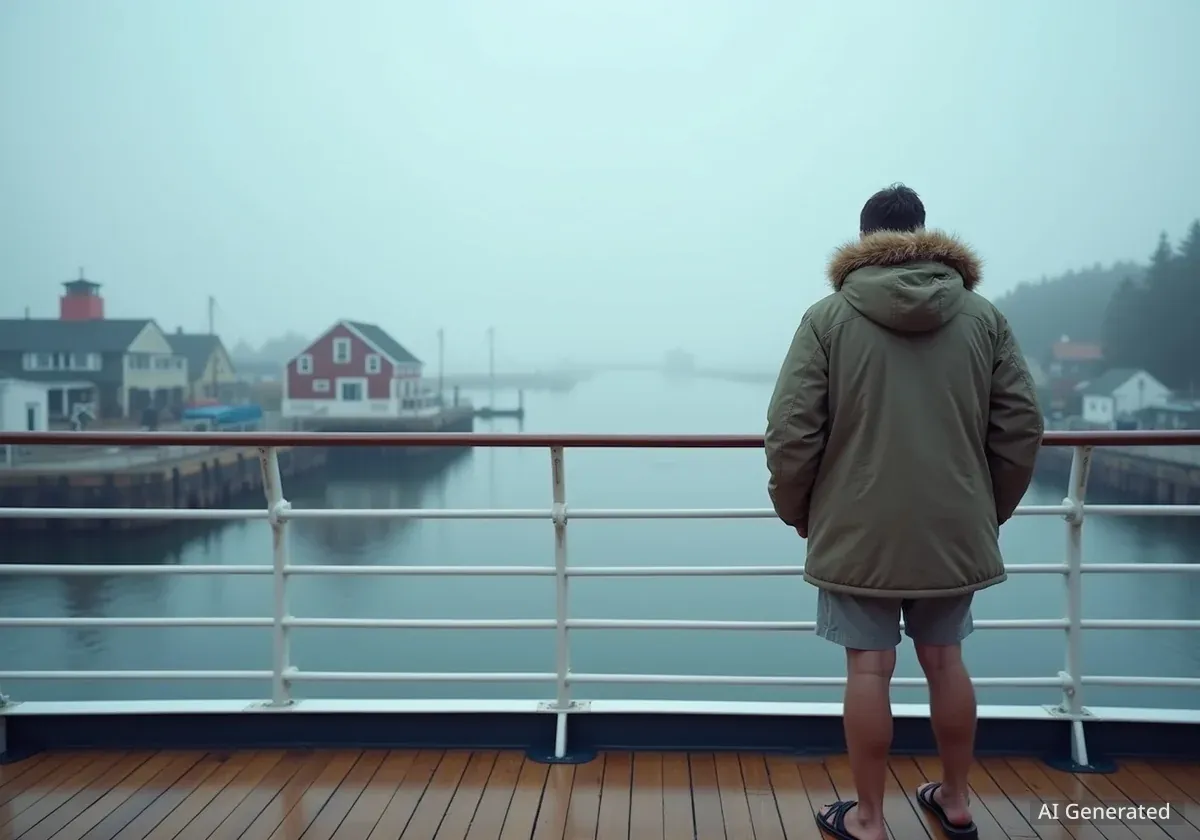Passengers expecting a warm Caribbean getaway aboard the Norwegian Cruise Line ship 'Norwegian Escape' instead found themselves sailing to chilly Maine. The itinerary change occurred at the last minute for a late September cruise, leaving many travelers unprepared with only warm-weather clothing.
Key Takeaways
- Norwegian Escape cruise diverted from Caribbean to Maine.
- Passengers received little notice, some while boarding.
- Many travelers were dressed for warm weather.
Sudden Change in Destination
The 'Norwegian Escape' was scheduled for a Caribbean itinerary. However, passengers reported receiving notification of a drastic change just before or during their boarding process. Instead of tropical sunshine, the ship headed north towards Maine, a stark contrast to the expected warm climate.
This unexpected shift left many travelers in a difficult situation. They had packed shorts, swimsuits, and light clothing, suitable for the Caribbean. Maine in late September typically experiences much cooler temperatures, making their attire highly unsuitable.
Fact Check
- Original Destination: Caribbean
- Changed Destination: Maine
- Time of Year: Late September
- Impact: Passengers were unprepared for cold weather.
Passenger Experiences and Reactions
Many North Jersey residents were among those affected by the last-minute change. They expressed frustration over the lack of timely communication from Norwegian Cruise Line.
“We were ready for beaches and warm water, not lobster boats and autumn chill,” one passenger reportedly stated.
The sudden change meant a complete alteration of their vacation plans. Instead of relaxing in tropical heat, they faced the prospect of exploring a much colder environment. This created discomfort and disappointment for those looking forward to a specific type of holiday.
Lack of Prior Notification
A significant point of contention for travelers was the timing of the notification. Some passengers only learned of the new itinerary as they were physically stepping onto the ship. This left no opportunity to adjust their packing or reconsider their travel plans.
Such late changes can severely impact a traveler's experience. It removes the element of choice and forces them into an unexpected situation without adequate preparation. This also raises questions about the cruise line's communication protocols for significant itinerary alterations.
Cruise Itinerary Changes
Cruise lines can change itineraries due to various reasons, including weather conditions, mechanical issues, or port closures. However, industry standards often suggest providing passengers with as much advance notice as possible for significant deviations from the booked schedule.
Implications for Travelers
The incident highlights the importance of being prepared for unforeseen circumstances when traveling, particularly on cruises. While passengers expect a certain level of reliability, external factors can sometimes force changes.
For those onboard the 'Norwegian Escape,' the immediate challenge was dealing with the weather. Many likely had to purchase warmer clothing on board or at their new port of call, incurring unexpected costs. Beyond the practical issues, there was also the emotional impact of a ruined vacation expectation.
Recourse and Compensation
Questions have arisen regarding potential recourse for the affected passengers. When a cruise itinerary is significantly altered, especially at the last minute, passengers often seek clarity on compensation, refunds, or future credits. The degree of compensation typically depends on the cruise line's policy and the specific circumstances of the change.
Travelers may need to review their booking terms and conditions to understand their rights in such situations. This unexpected event serves as a reminder for all travelers to familiarize themselves with the fine print of their travel contracts.
- Check cruise line's policy on itinerary changes.
- Consider travel insurance that covers trip interruptions.
- Pack versatile clothing for varied temperatures.
Looking Ahead
This incident with the 'Norwegian Escape' underscores the unpredictable nature of travel. While cruise lines aim to provide planned experiences, unforeseen events can lead to significant disruptions. Passengers are left to adapt and seek resolution for their altered journeys.
The experience serves as a case study for both travelers and the travel industry. It emphasizes the need for transparent communication and robust contingency planning to minimize passenger inconvenience during unexpected itinerary changes.





